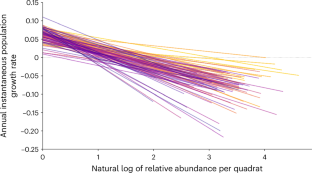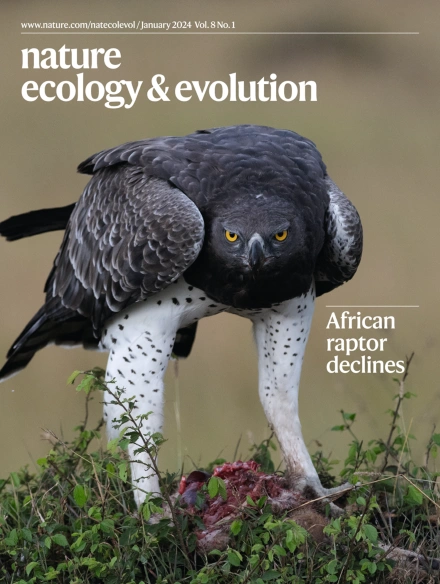Frequency-dependent assembly processes determine the coexistence and relative abundance of tropical plant species
IF 13.9
1区 生物学
Q1 ECOLOGY
引用次数: 0
Abstract
Testing the extent to which ecological communities are structured by deterministic (niche-based) assembly processes, resulting in predictable species abundance and composition, is a fundamental goal of ecology. Here we use a 10-year dataset of 55,156 lianas comprising 86 species in an old-growth tropical forest in Panama to test whether community assembly is consistent with niche-based assembly processes. We find that species diversity and community composition was maintained because species conformed to four general requirements of coexistence theory: (1) species have negative conspecific frequency-dependent feedback that control their local population size; (2) species have a stronger negative effect on their own population than that of heterospecifics; (3) the equilibrium frequencies of species correspond to their relative abundance; and (4) species have positive invasibility. These results indicate that coexistence through deterministic niche-based processes controls local population sizes and prevents any one species from displacing others. Rare species persisted because particularly strong negative feedbacks maintained them at their relatively low equilibrium abundances, thus preventing them from going extinct. Furthermore, we show that it is necessary to use population demography to test coexistence theory because stem mortality alone does not reflect species demography. These findings have broad implications for species coexistence and diversity maintenance in tropical forests and possibly other ecosystems. Ecological communities may arise through distinct assembly processes, which are difficult to disentangle. Here the authors show that deterministic niche-based, not neutral dispersal, assembly processes explain the vast majority of the structure of a tropical forest liana community.


频率相关的组装过程决定了热带植物物种的共存和相对丰度
生态学的一个基本目标是测试生态群落在多大程度上是由确定性(基于生态位的)组装过程构成的,从而产生可预测的物种丰度和组成。在这里,我们使用了巴拿马原始热带森林中包含86种物种的55,156种藤本植物的10年数据集来测试群落组装是否与基于生态位的组装过程一致。研究发现,物种多样性和群落组成得以保持,是因为物种符合共存理论的四个一般要求:(1)物种具有负的同比频率相关反馈,控制着其局部种群规模;(2)物种对自身种群的负向影响大于异种种群;(3)物种的平衡频率与其相对丰度相对应;(4)物种具有正入侵性。这些结果表明,共存通过确定性的生态位过程控制着当地的种群规模,并防止任何一个物种取代其他物种。稀有物种得以延续,是因为特别强烈的负反馈使它们保持在相对较低的平衡丰度,从而防止它们灭绝。此外,我们表明有必要使用人口统计学来检验共存理论,因为单独的茎死亡率不能反映物种人口统计学。这些发现对热带森林和其他生态系统的物种共存和多样性维持具有广泛的意义。
本文章由计算机程序翻译,如有差异,请以英文原文为准。
求助全文
约1分钟内获得全文
求助全文
来源期刊

Nature ecology & evolution
Agricultural and Biological Sciences-Ecology, Evolution, Behavior and Systematics
CiteScore
22.20
自引率
2.40%
发文量
282
期刊介绍:
Nature Ecology & Evolution is interested in the full spectrum of ecological and evolutionary biology, encompassing approaches at the molecular, organismal, population, community and ecosystem levels, as well as relevant parts of the social sciences. Nature Ecology & Evolution provides a place where all researchers and policymakers interested in all aspects of life's diversity can come together to learn about the most accomplished and significant advances in the field and to discuss topical issues. An online-only monthly journal, our broad scope ensures that the research published reaches the widest possible audience of scientists.
 求助内容:
求助内容: 应助结果提醒方式:
应助结果提醒方式:


